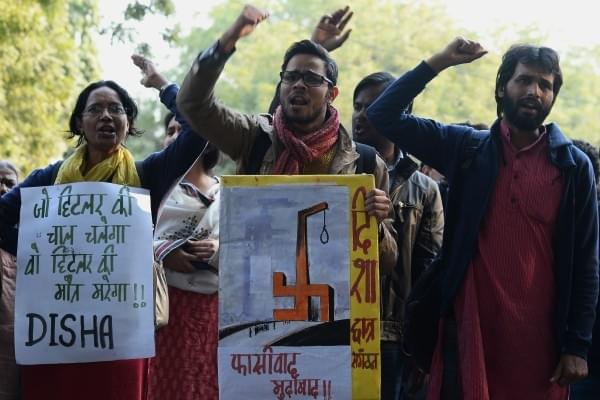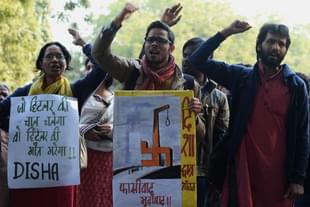Politics
Do Sedition Charges Apply In The JNU Case?
Rohit Kumar
Feb 18, 2016, 06:35 PM | Updated Feb 19, 2016, 12:10 PM IST
Save & read from anywhere!
Bookmark stories for easy access on any device or the Swarajya app.


There are legal provisions other than the charges of sedition which the government can use against anti-India sloganeering.
The recent incident of anti-India and pro-Pakistan slogan-shouting in one of the pioneering temples of learning in the country is reminiscent of the great Roman philosopher Marcus Tullius Cicero’s saying –
A nation can survive its fools and even the ambitious but it can’t survive treason from within. An enemy at the gates is less formidable, for he is known and carries his banner openly but a traitor moves amongst those within the gate freely, his sly whispers rustling through all the alleys, heard in the very halls of government itself. A murderer is less too fear, the traitor is the plague.
These were certainly not slogans expressing dissent against the government; they were directed instead at the very existence of India.
The Weak Basis Of The Charges Of Sedition
The sedition charges slapped in the existing case don’t seem tenable. The Supreme Court had clarified in Kedarnath Singh v State of Bihar that Section 124A of the Indian Penal Code aims to penalize only such activities that are intended, or have a tendency, to create disorder or disturb public peace by resort to violence. In the present scenario, there was no ostensible ‘‘resort to violence’’ and hence the charges of sedition shall hardly be sustainable in legal eyes.
However, the Kedarnath case cannot be equated with the present case as the facts are different in the two cases. In the Kedarnath case, the accused had merely used polemics such as “Dogs of the CID” and “Congress Goondas”. In contrast, in the present case, apart from anti-India and pro-Pakistan slogans, the protesters have threatened to “continue [their] battle till the downfall of the Indian state and the breaking of India into pieces.”
Relevance Of The Unlawful Activities (Prevention) Act 1967 (UAPA)
The Unlawful Activities (Prevention) Act is a law specifically designed to deal with anti-national activities directed against the integrity and sovereignty of India. This legislation got Presidential assent on 30 December 1967 after being passed by both Houses. The application of certain provisions of this Act in the current context shall have a greater deterrent effect than charges of sedition and there is a greater likelihood that it may sustain in a court of law as well.
The persons charged under this Act include, among others, Maoist militant Kobad Gandhi and rights activist Binayak Sen. Two particular provisions of this Act are pertinent here. These two provisions are Section 2(1)(o) which defines ‘Unlawful Activities’ and Section 13 which prescribes the punishment for such activities. For a better understanding of the propinquity between the ongoing controversy and the application of these provisions, it is useful to quote Section 2(1)(o) here in its entirety:
(o) “Unlawful activity”, in relation to an individual or association, means any action taken by such individual or association (whether by committing an act or by words, either spoken or written, or by signs or by visible representation or otherwise)–
(i) Which is intended, or supports any claim, to bring about, on any ground whatsoever, the cession of a part of the territory of India or the secession of a part of the territory of India from the Union, or which incites any individual or group of individuals to bring about such cession or secession; or
(ii) Which disclaims, questions, disrupts or is intended to disrupt the sovereignty and territorial integrity of India; or
(iii) Which causes or is intended to cause disaffection against India.
While the purview of Section 124A is limited in scope only to hatred, contempt and disaffection towards the Government of India, the broader ambit of Section 2(1)(o) of UAPA extends the government’s power to preserve and protect, inter alia, the sovereignty and integrity of India.
Anti-India Slogans Are Not Protected By ‘Article 19(1)(a)
However precious the freedom of speech may be in a democratic society, the means can never override the end itself. No freedom is absolute and Article 19(1)(a) is no exception. It is subject to reasonable restrictions as enlisted in Clause 2 of Article 19. One major ground of reasonable restriction is the sovereignty and security of India.
Eminent jurist DD Basu in his commentary on the Constitution of India explains that this ground was added as a restriction of the freedom of expression by the Sixteenth Amendment of the Constitution. The object was to enable the state to combat cries for secession because no independent country can tolerate any agitation on the part of any unit of its territory either to secede and form an independent state or to integrate with a foreign state.
In the United States, in the seminal case of Stromberg v California in 1931, it was held that “no state can, therefore, tolerate utterances which threaten to overthrow the organized government by unlawful or unconstitutional means.”
The Need For Constitutional Morality Among Citizens
Dissent is undoubtedly the cornerstone of a vibrant democracy like India. This has been expressly recognized in the Constitution as well as in Article 19(1)(a). But the question emerges on whether dissent is permissible to such a level so as to tolerate people who swear to break the very nation which gives them the right to dissent, or people who vow to continue to battle till the downfall of the State.
Is dissent bigger than the nation itself? The answer to these questions is certainly ‘no’. The reason is simple: one can’t be allowed to take the cover of constitutional provisions in swearing to break the country which is run by the same Constitution. The right to criticize the Government is genuine and should certainly be safeguarded but there is no right to threaten the very existence of the State under any circumstances. That is where the constitutional morality of citizens must stand strong.
Rohit Kumar is a B.A. LL.B Student, in School of Law, KIIT University, Bhubaneswar. He regularly blogs for different Platforms on Socio-Politico and Legal issues.





